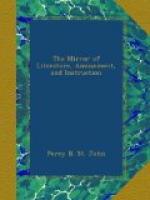T. GILL.
Splendid Biography.—Richard Neville, the Great Earl of Warwick and Salisbury, was well known in history by the appellation of the King Maker. His biographer says, “He was a man whose hospitality was so abundant, that the ordinary consumption of a breakfast, at his house in London, was six oxen; whose popularity was so great, that his absence was accounted as the absence of the sun from the hemisphere; whose service was so courted, that men of all degrees were proud to wear the badges of his livery; and whose authority was so potent, that kings were raised, or deposed, as suited his humour.”
P.T.W.
Character of England by Henry the Seventh.—Henry the Seventh (whose breeding had been low and private) being once pressed by some of his council, to pursue his title to France, returned this answer: “That France was indeed a flourishing and gallant kingdom; but England, in his mind, was as fine a seat for a country gentleman as any that could be found in Europe.”
G.K.
The Plough.
“Look how the purple flower,
which the plough
Hath shorn in sunder, languishing doth die.”
Peachum.
This implement was known to the Egyptians, Greeks, and Romans, and was invented at a very early period, being perhaps nearly coeval with the cultivation of the soil itself. Anciently, the tenants (in England) in some manors, were not allowed to have their rural implements sharpened by any but those whom the lord appointed; for which an acknowledgment was to be paid, called agusa dura; in some places agusage, a fee for sharpening plough-tackle, which some take to be the same with what was otherwise called reillage, from the ancient French reille, a ploughshare.
Ancient Fete at Gorhamlury.—In the year 1577, Queen Elizabeth was entertained at Gorhambury, by Sir Nicholas Bacon, Lord Keeper, from Saturday, May the 18th, to the Wednesday following, at the expense of 577_l_. 6_s_. 7-1/4_d_. besides fifteen bucks and two stags. Among the dainties of the feathered kind, enumerated in this entertainment, Mr. Nichols mentions herons, bitterns, godwites, dotterels, shovelers, curlews, and knots. Sir Nicholas Bacon was frequently visited by the queen, who dated many of her state papers from Gorhambury.
P.T.W.
Adrian the Fourth.—Adrian the Fourth was the only Englishman who ever filled the Papal chair. His name was Nicholas Breakspeare, and he was born at Abbot’s Langley, a village in Herts. Such was the unbounded pride of this pontiff, that when the Emperor Frederick the First went to Rome, in 1155, to receive the imperial diadem, the Pope, after many difficulties concerning the ceremonial of investiture, insisted that the emperor should prostrate himself before him, kiss his feet, hold his stirrup, and lead the white palfrey on which the holy father rode. Frederick did not submit to this humiliation




